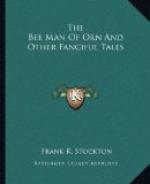“How happy they look, sitting there together,” said the Dryad; “and I don’t believe it will do them a bit of harm to be still younger.” And moving quietly up behind them, she first kissed Old Pipes on his cheek and then his mother.
Old Pipes, who had stopped playing, knew what it was, but he did not move, and said nothing. His mother, thinking that her son had kissed her, turned to him with a smile and kissed him in return. And then she arose and went into the cottage, a vigorous woman of sixty, followed by her son, erect and happy, and twenty years younger than herself.
The Dryad sped away to the woods, shrugging her shoulders as she felt the cool evening wind.
When she reached the great oak, she turned the key and opened the door. “Come out,” she said to the Echo-dwarf, who sat blinking within. “Winter is coming on, and I want the comfortable shelter of my tree for myself. The cattle have come down from the mountain for the last time this year, the pipes will no longer sound, and you can go to your rocks and have a holiday until next spring.”
Upon hearing these words the dwarf skipped quickly out, and the Dryad entered the tree and pulled the door shut after her. “Now, then,” she said to herself, “he can break off the key if he likes. It does not matter to me. Another will grow out next spring. And although the good piper made me no promise, I know that when the warm days arrive next year, he will come and let me out again.”
The Echo-dwarf did not stop to break the key of the tree. He was too happy to be released to think of any thing else, and he hastened as fast as he could to his home on the rocky hill-side.
* * * * *
The Dryad was not mistaken when she trusted in the piper. When the warm days came again he went to the oak-tree to let her out. But, to his sorrow and surprise, he found the great tree lying upon the ground. A winter storm had blown it down, and it lay with its trunk shattered and split. And what became of the Dryad, no one ever knew.
The queen’s museum.
* * * * *
There was once a Queen who founded, in her capital city, a grand museum. This institution was the pride of her heart, and she devoted nearly all her time to overseeing the collection of objects for it, and their arrangement in the spacious halls. This museum was intended to elevate the intelligence of her people, but the result was quite disappointing to the Queen. For some reason, and what it was she could not imagine, the people were not interested in her museum. She considered it the most delightful place in the world, and spent hours every day in examining and studying the thousands of objects it contained; but although here and there in the city there was a person who cared to visit the collection, the great body of the people found it impossible to feel the slightest interest in it. At first this grieved the Queen, and she tried to make her museum better; but as this did no good, she became very angry, and she issued a decree that all persons of mature age who were not interested in her museum should be sent to prison.




